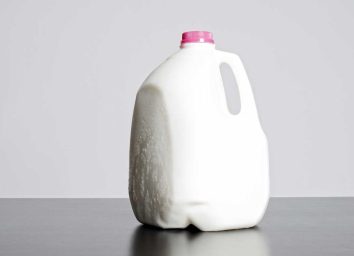Major Recent Findings About Dairy You Should Know

Editor's Note: A previous version of this story included a miscalculation of individual risk from the findings of a study detailed below.
Milk is a polarizing food these days. To drink, or not to drink? For years, research has been published that supports both sides of the question—and this year is no exception.
At the beginning of the year, Walter Willett, MD, DrPH, a professor of nutrition and epidemiology at the Harvard T.H. Chan School of Public Health, and David Ludwig, MD, PhD, a professor of pediatrics and nutrition at Harvard, released a review in The New England Journal of Medicine challenging the need for dairy in the human diet. Currently, U.S. dietary guidelines recommend that the average person has three servings of dairy per day. However, Willett described the country's basis of calcium recommendations as "fundamentally flawed." (Related: 15 Classic American Desserts That Deserve a Comeback)
Another review published this year in Nutrition Reviews by Elizabeth Jacobs, PhD, a professor of epidemiology, biostatistics, and nutritional sciences at the University of Arizona Mel & Enid Zuckerman College of Public Health in Tucson, argued that dairy shouldn't even be considered a separate food group on the dietary guidelines. Instead, the review suggested that dairy products should be included in the protein category as an option people can opt to eat to help meet their daily protein requirements.
However, neither of the reviews suggested that dairy products were harmful to overall health. In fact, Jacobs pointed out that people were naturally moving away from milk consumption and instead gravitating toward milk alternatives. Willett also mentioned that dairy farming was especially rough on the environment—and something that could exacerbate climate change even more.
At the same time, another study published this year indicated that dairy could potentially cause adverse health outcomes. The study, which was commissioned by the National Cancer Institute at the National Institutes of Health and the World Cancer Research Fund, revealed that women who drank between two and three cups of cow's milk every day increased their individual risk of breast cancer by as much as 80% in comparison with women who drank soy milk. The average risk a woman has of developing breast cancer is about 12%. According to this study, if she were to drink 16 to 24 ounces of milk a day, her risk could increase from 12% to 21.6%. (Related: What Happens to Your Body When You Can't Have Dairy)
However, other research from this year encouraged dairy consumption for its supply of vital nutrients and health benefits. More recently, a study funded by the National Dairy Council published in the Journal of the American College of Nutrition found that consuming dairy foods such as milk, cheese, yogurt, and milk proteins might actually have neutral to beneficial effects on inflammation. Chris Cifelli, Ph.D., the VP of Nutrition Research at the National Dairy Council, and one of the authors of the study, added that milk offered nine essential nutrients, including vitamin D and potassium.
Our thoughts? There is no right or wrong answer. As is the case with most foods, it largely comes down to personal choice. Ask yourself these questions: How do you feel when you eat dairy? And how do you believe dairy negatively or positively impacts the body?
For more, read up on 5 Warning Signs You're Drinking Too Much Milk.








